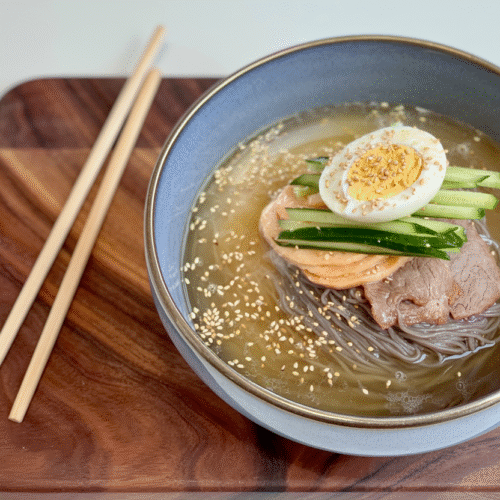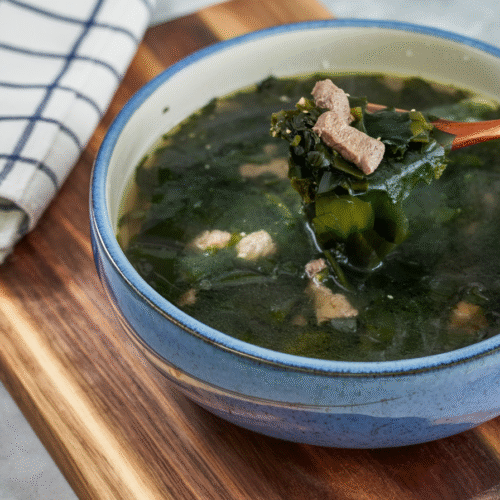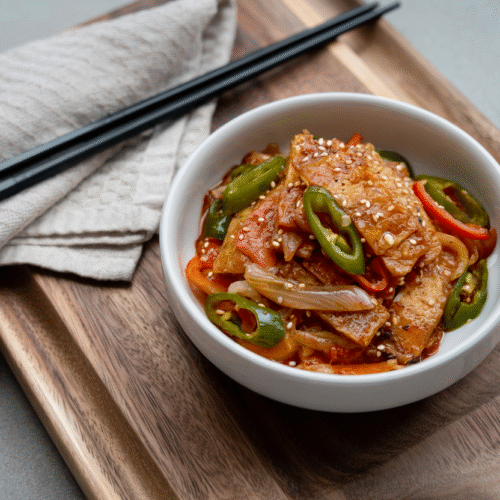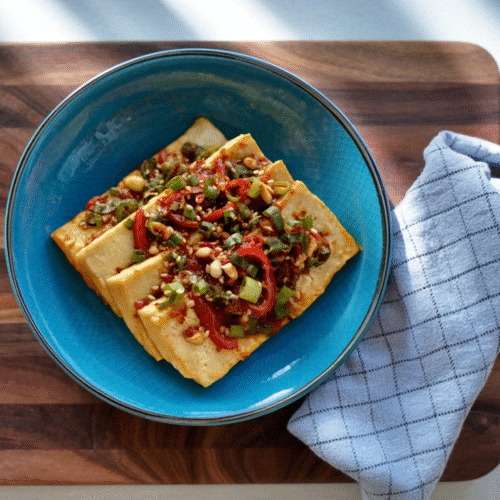Ingredients
For the Beef Broth
- 2 lbs beef brisket
- 1/2 lb Korean radish
- 1 small onion
- 8 green onion roots (white parts)
- 8 cloves garlic
- 2 tablespoons dashida (Korean beef bouillon)
- 1 teaspoon black peppercorns
- 8 cups water
For the Quick Radish Kimchi
- 1 lb Korean radish, peeled & thinly sliced
- 1/4 cup white vinegar
- 2 tablespoons sugar
- 2 teaspoons salt
- 2 teaspoons gochugaru
For the Final Broth & Assembly
- 4-8 cups dongchimi broth
- 1 lb naengmyeon noodles (chik-naengmyeon is recommended)
- Light brown sugar, to taste
- Low-sodium soy sauce, to taste
- Thinly sliced cucumber
- 2 hard-boiled eggs, halved
- Crushed sesame seeds
- White vinegar
- Korean yellow mustard paste (optional)
First, Make the Broth and Quick Kimchi
This dish is all about the broth, which needs time to cool completely.
Soak the brisket in cold water for 30 minutes to draw out impurities.
In a large pot or pressure cooker, combine the soaked brisket, Korean radish, onion, green onion roots, garlic, dashida, and black peppercorns. Add the 8 cups of water. If using a pressure cooker, cook for 40 minutes. On the stovetop, bring to a boil and simmer for ~1.5-2 hours, adding more water if needed.
While the broth cooks, make the quick radish kimchi. Combine the thinly sliced Korean radish with the vinegar, sugar, salt, and gochugaru. Set aside.
Once the beef broth is done, strain it, discarding the solids. Skim as much fat as possible from the surface for a clean broth. Let the cooked brisket cool, then thinly slice it against the grain.
Next, Chill and Season the Broth
In a large container, combine the strained beef broth with the dongchimi broth. The ratio is up to you; I prefer equal parts, but you can add the dongchimi brine slowly and taste as you go.
Place this broth mixture in the freezer for a couple of hours, until it’s ice cold and slushy around the edges.
Flavor is muted in cold liquids, so it’s important to season the broth after it’s icy. Add soy sauce and a little brown sugar to taste. Most people prefer it slightly sweet.
Finally, Cook Noodles and Assemble
When you’re ready to eat, cook the naengmyeon noodles. They cook very quickly, usually in ~2-3 minutes. Immediately drain and rinse them under ice-cold water to remove excess starch and keep them chewy.
Divide the cold noodles into four large bowls. Top with the sliced brisket, a portion of the quick radish kimchi, sliced cucumber, a hard-boiled egg half, and a sprinkle of crushed sesame seeds.
Ladle the icy broth over the top and serve immediately with extra vinegar and Korean mustard paste on the side for everyone to season their own bowl.
Mul Naengmyeon (Korean Cold Noodles)

Ingredients
For the Beef Broth
- 2 lbs beef brisket
- 1/2 lb Korean radish
- 1 small onion
- 8 green onion roots white parts
- 8 cloves garlic
- 2 tablespoons dashida Korean beef bouillon
- 1 teaspoon black peppercorns
- 8 cups water
For the Quick Radish Kimchi
- 1 lb Korean radish peeled & thinly sliced
- 1/4 cup white vinegar
- 2 tablespoons sugar
- 2 teaspoons salt
- 2 teaspoons gochugaru
For the Final Broth & Assembly
- 4-8 cups dongchimi broth
- 1 lb naengmyeon noodles chik-naengmyeon is recommended
- Light brown sugar to taste
- Low-sodium soy sauce to taste
- Thinly sliced cucumber
- 2 hard-boiled eggs halved
- Crushed sesame seeds
- White vinegar
- Korean yellow mustard paste optional
Instructions
- Soak brisket in cold water for 30 minutes.
- Combine brisket, radish, onion, green onion roots, garlic, dashida, peppercorns, and water in large pot.
- Simmer for 2 hours until meat is tender.
- Mix sliced radish with vinegar, sugar, salt, and gochugaru for quick kimchi. Set aside.
- Strain broth and skim fat. Cool and slice brisket against grain.
- Mix beef broth with dongchimi broth in equal parts.
- Freeze broth mixture until slushy, about 2 hours.
- Season cold broth with soy sauce and brown sugar to taste.
- Cook naengmyeon noodles 2-3 minutes, rinse in ice water.
- Divide noodles between bowls. Top with brisket, quick kimchi, cucumber, egg halves, sesame seeds.
- Pour icy broth over noodles and serve immediately.




